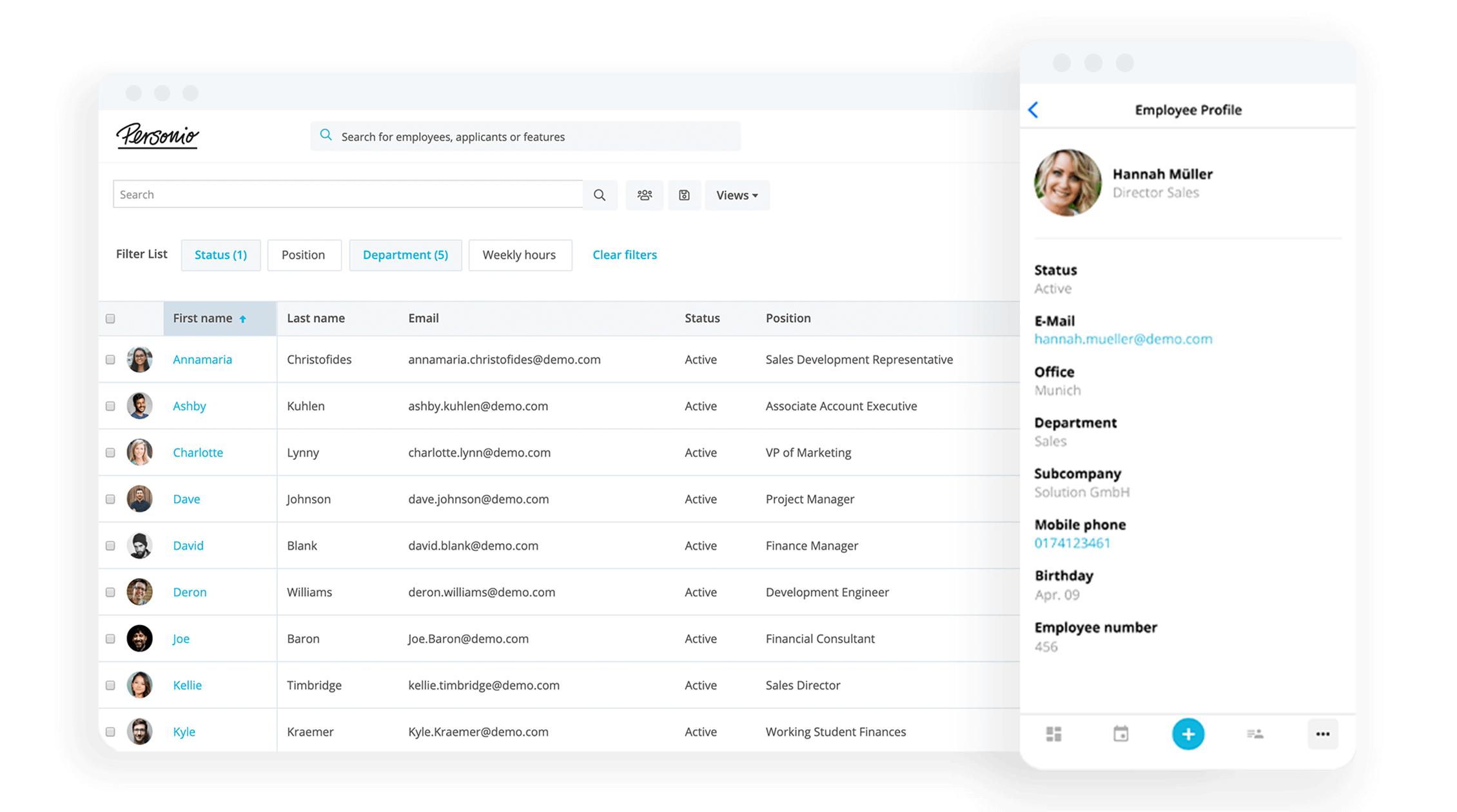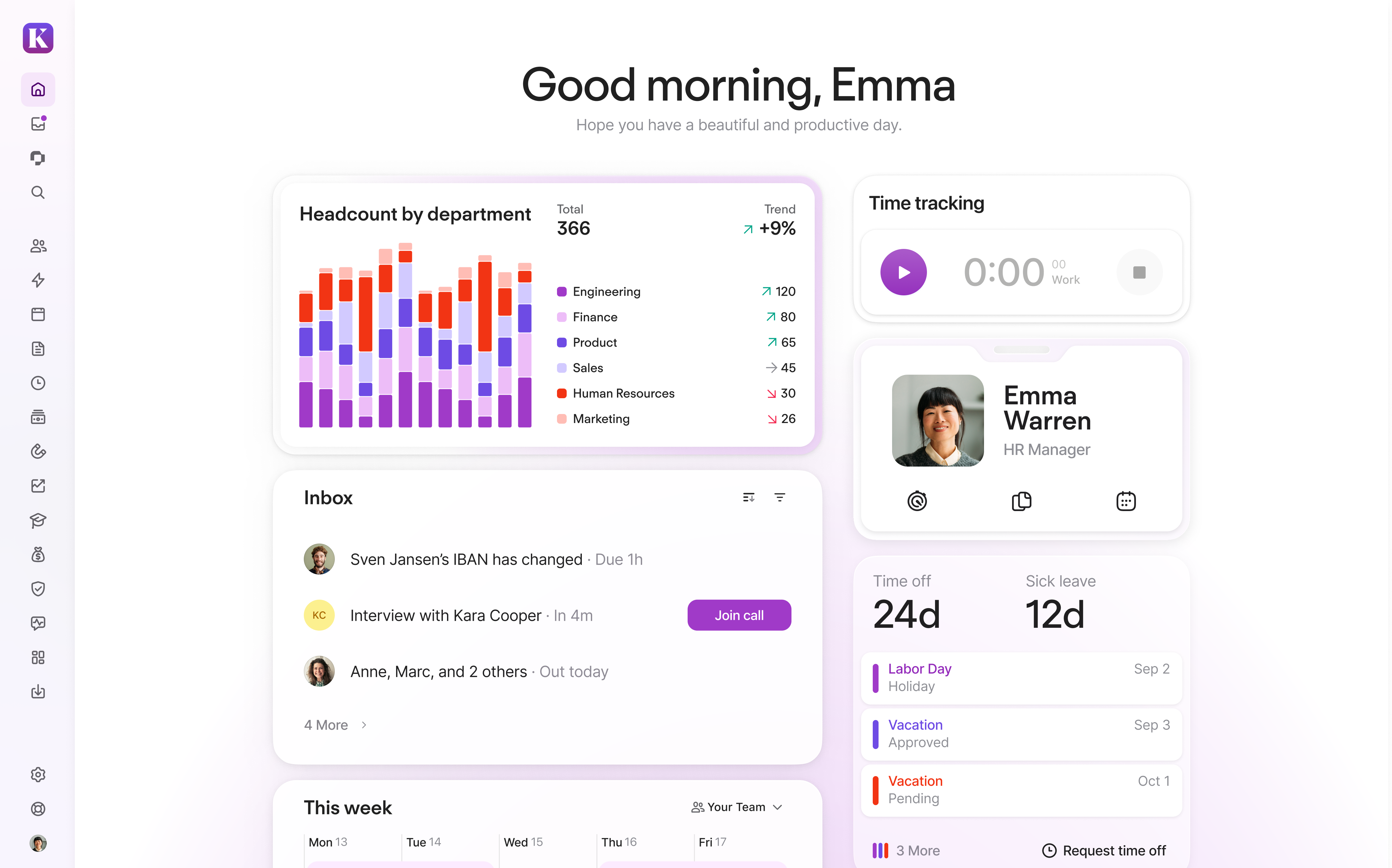
Personnel File Checklist (UK)
Keep Employee Data at Your Fingertips
Latest Blog Posts
What is an HR database (and how does it work)?

How are you currently storing employee information? If it’s across spreadsheets, emails and pieces of paper, you may need to make a change. An HR database can serve as the backbone of your HR department, providing a centralised place for all your employee-related information.
To help you understand the importance of a robust HR database, we put together this article to help you outline what to expect and how our team at Personio has developed a comprehensive solution that not only simplifies data management but also enhances the way HR runs in total.
Optimise your core HR process across the entire employee lifecycle. Download our guide for help.What is an HR database?
An HR database is a digitised system where companies store and manage employee information. Databases like these will often include a wide range of information such as personal details, job roles, performance metrics and more. The goal of an HR database is to streamline processes, improve data accuracy and provide the ability to derive valuable insights for better decision-making.
The 7 key components of an HR database
A well-structured HR database is most likely to include most or all of the following elements:
Personal information | Employee names, addresses, contact details and emergency contacts. |
Personal information | Job titles, departments, reporting lines and employment history. |
Compensation and benefits | Salary information, bonuses, benefits packages and payroll data. |
Performance data | Performance reviews, goals, achievements and feedback. |
Training and development | Records of training sessions, certifications and development programs. |
Attendance and leave | Absence records, leave balances and time-off requests. |
Compliance and legal | Documentation related to compliance, contracts and legal requirements. |
Keep Your Employee Files Accurate, Always

Ensure all employee files are always up-to-date, organised, complete and data-compliant.
The important role of an HR database
While an HR database should be able to house a lot of information, it’s not so much about how much it can hold — but what it can provide with that information. An HR database is indispensable for several reasons:
Efficiency: Automates routine tasks, reducing the administrative burden on HR teams.
Accuracy: Ensures data consistency and reduces errors associated with manual data entry.
Compliance: Helps maintain compliance with labour laws by keeping accurate records.
Decision-making: Provides data-driven insights that aid in strategic planning and decision-making.
Employee experience: Enhances the employee experience by providing transparency and easy access to personal information.
Best practices for building and maintaining an HR database
What can you do to ensure that your HR database is providing the most possible value for your organisation? Based on our own experience building Personio’s all-in-one HR software solution, we’d recommend ensuring any system you use abides by the following three best practices.
1. Bring all of your data into one place
Your employee data deserves to be in one location. This ensures easy access and maintains data consistency for your HR team and your organisation. This will allow your HR team to not only have the data they need when they need it, but to become more data-driven and more strategic in how they work.
2. Capitalise on the power of employee self-service
You should empower your employees to update their own information through employee self-service (ESS) portals. This keeps data current while reducing the administrative burden on HR teams. Make it easy for employees to manage their personal details, request time off and access important documents.
3. Implement airtight security measures
There is quite possibly nothing more important than your employee data. When you’re managing their data, you also need to ensure that it is under lock and key. Here are some of the things to consider:
Access controls: Limit database access to authorised personnel.
Encryption: Encrypt data in transit and at rest.
Regular backups: Perform regular backups to prevent data loss.
How Personio enhances HR database management

How important is your employee information to your team? Personio takes the concept of an HR database to the next level by offering a suite of features designed to optimise HR processes and improve overall efficiency — for employees, line managers and HR teams alike.
Here is how we do it:
Centralised data management: A single platform where employee data is stored securely. This level of centralisation ensures that information is easily accessible and up-to-date, eliminating the need for multiple spreadsheets or disparate systems.
Automated workflows: Personio’s workflow automation brings benefits across onboarding, performance reviews, and payroll processing. This automation not only saves time but also reduces the risk of errors, ensuring that tasks are completed accurately and on time.
Advanced analytics: Personio offers powerful analytics tools that provide insights into key HR metrics. From employee turnover rates to performance trends, we help HR professionals make informed decisions that drive organisational success.
Compliance and security: HR compliance is a top priority for us. Our platform is designed to meet stringent data protection regulations, ensuring that sensitive employee information is safeguarded.
Employee self-service: Empowering employees to manage their own data is a key feature of Personio. We allow employees to update personal information, request time off and access important documents — while giving HR the ability to review and approve, as needed.
Built for impact: Personio has transformed HR work for thousands of businesses. For instance, the team at Mindful Chef highlights how Personio's balanced offering of recruitment, performance, and payroll functions has streamlined their HR processes and improved overall efficiency.
Do you need an HR database?
The fact is that an HR database is far more than a place to store data. Instead, it can be a powerful tool to transform HR operations. With Personio, organisations can unlock the full potential of their HR data, driving efficiency, accuracy and strategic decision-making. Whether you're looking to automate routine tasks, gain valuable insights or ensure compliance, Personio's HR software has you covered.
Discover how Personio can help you manage your HR database more effectively by speaking with an expert today.

